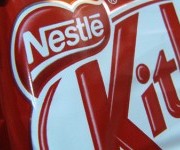Organic isn’t better for you? Give us a break, Nestlé.Photo: Howard LakeIn eye-opening comments to Fast Company this weekend, Nestlé’s chairman and former CEO Peter Brabeck-Letmathe offers a lengthy disquisition on the “problems” associated with organic foods and covers all the classic anti-organic arguments, from “organic can’t feed the world” to “organic isn’t any better for you.” He concludes by declaring that organic food sales in the U.S. and Europe have likely hit their peak. “I don’t think it will grow much more,” he adds.
To a large extent, this is a guy talking his book, as the financial types say. In the article, Fast Company observes that Nestlé “has made acquisitions of several premium brands that organic-loving people tend to buy: San Pellegrino water, PowerBar energy bars, and Skinny Cow ice cream.” However, none of those brands are organic. And a quick glance at the organic industry structure shows us that Nestlé is barely involved. They don’t own a significant stake in a single major organic brand, despite that fact that their closest candy competitors have all done so (Hershey owns Dagoba and Cadbury owns Green and Black’s).
It’s discouraging, if not surprising, to see the old “organic can’t feed the world” canard gracing the pages of another well-intentioned media outlet. But Brabeck-Letmathe isn’t content to rehash that tired trope. To heighten his argument, Brabeck-Letmathe also drags out the ancient claim that organic foods cause “30 to 40 deaths per year” in consumers due to improper use of manure in organic production. Over on Civil Eats, Anna Lappé has done a thorough job of documenting the long history of this false claim — going back to a retracted 20/20 news report from a decade ago. She also cleverly points to the fact that Brabeck-Letmathe has been giving essentially this same interview for years.
It’s clear that Brabeck-Letmathe has multiple reasons for attacking organics. For one, his prediction about a plateau in the rise of organic sales rings hollow if you’ve been paying attention; from 2009 to 2010 (arguably the depths of the current recession) organics went up 7.7 percent. But whole, organic, and unprocessed foods don’t only represent a direct threat to Nestlé’s sales, they threaten its new business lines.
You see, Brabeck-Letmathe tells Fast Company that Nestlé is in the process of developing a line of neutraceuticals, or foods designed to treat or prevent disease. And it’s not unreasonable to assume that some of those foods will be designed to directly address diabetes or another chronic disease linked with obesity.
It may sound ironic that a company built on candy, sweetened beverages, and highly processed convenience foods hopes to move into the business of treating obesity. On the other hand, the audience for such products is growing rapidly; indeed, it’s an epidemic that, according to research appearing in the medical journal The Lancet, is just getting started. New estimates suggest that half the U.S. population will be managing obesity (and the illnesses that accompany it) by 2030.
So, it appears the idea is that you eat Nestlé’s highly processed food until you contract diabetes or another related disease, at which point you will switch to their neutraceutical products to manage the illness. It really is the perfect business model.



